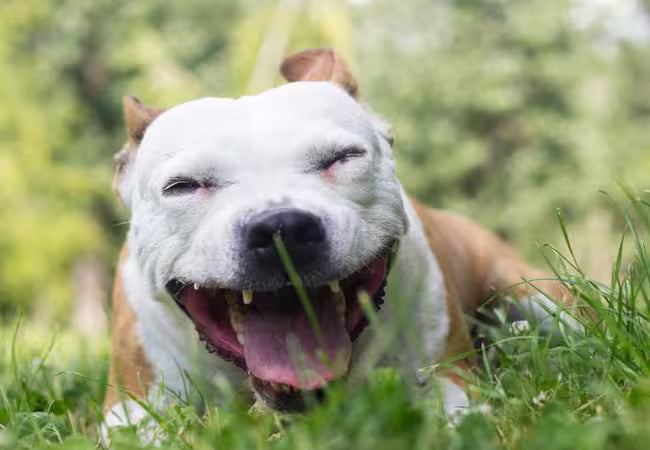2025 Vet Guide: Why Is My Dog Coughing and Gagging? Causes, Treatment & Care 🐶💨

In this article
2025 Vet Guide: Why Is My Dog Coughing and Gagging? Causes, Treatment & Care 🐶💨
By Dr. Duncan Houston BVSc
Coughing and gagging can be alarming, but they’re often protective reflexes. While occasional episodes aren’t a concern, persistent or severe signs may indicate underlying illness. This guide helps you understand causes, red flags, diagnostics, treatments, and how to support your dog effectively.
🔍 1. Coughing vs Gagging: Definitions
- Cough: Forceful expulsion of air to clear airways—sometimes accompanied by saliva.
- Gag: Retching reflex without vomiting, often triggered by irritation of the larynx or throat.
⚠️ 2. When to Be Concerned
If your dog is bright, eating, and drinking well, mild occasional coughing or gagging can be observed for 48–72 hours. But seek vet help if:
- Cough/gag is frequent or severe, especially with distress or loud breathing.
- Loud honking, choking, drooling, or pawing at the throat.
- Accompanied by vomiting, fever, lethargy, weight loss, or collapse.
🦠 3. Common Causes
- Kennel cough: Harsh “goose honk” cough, often gag afterward—common in social environments.
- Pneumonia/bronchitis: Wet cough, fever, nasal discharge—may escalate to gagging.
- Heart/lung disease: Persistent cough, especially at night or after exercise, gagging, possibly from fluid buildup.
- Laryngeal paralysis: Older large breeds—gagging or coughing during eating/drinking; noisy breathing.
- Tracheal collapse: Honking cough in small breeds; cough/gag worsens with excitement/exercise.
- Foreign body: Sudden violent cough/gag—food, grass awns, debris lodged in throat.
- Acid reflux/esophagitis: Repetitive gagging or dry cough, often along with regurgitation.
🩺 4. Diagnostic Approach
- Physical exam with chest auscultation and throat assessment.
- Chest X-rays or bronchoscopic imaging for infectious, structural, or cardiac causes.
- Bloodwork, heartworm test, and airway swabs for infection or inflammation.
- Sedated laryngeal exam for paralysis evaluation.
- Endoscopy is recommended if a foreign object or esophageal disease is suspected.
🛠️ 5. Treatment & Support
- Kennel cough: Rest, isolated environment, antibiotics, anti-inflammatories, cough suppressants.
- Pneumonia/bronchitis: Antibiotics, nebulization, oxygen therapy in severe cases.
- Heart/lung disease: Manage with diuretics, ACE inhibitors, lifestyle modification.
- Laryngeal paralysis: Restrict exercise, avoid overheating; surgical tie-back may be indicated.
- Tracheal collapse: Weight management, harness use, cough suppressants, possibly stents for advanced cases.
- Foreign body removal: Prompt veterinary or endoscopic extraction.
- Acid reflux: Dietary changes, prokinetics, antacids.
🏡 6. Home Comfort & Prevention
- Isolate ill dogs and maintain a clean, humidified environment.
- Use harnesses, avoid collars in tracheal collapse or laryngeal disease.
- Keep vaccinations and kennel cough boosters up to date.
- Monitor for early signs and report changes to your vet.
📱 7. Useful Care Tools
- Ask A Vet: Rapid triage for breathing distress, advice on diagnostics and treatment.
- Woopf: Logs medication times, breathing events, and specialist visits.
- Purrz: Track cough/gag frequency, triggers, response to treatment—supports adjustment and vet discussion.
📚 FAQ
Q: Can kennel cough cause gagging?
Yes—the harsh “goose-honk” cough is often followed by gagging due to tracheal irritation.
Q: Is a honking cough always tracheal collapse?
Not always, but it’s a key sign, especially in small breeds. A vet exam and imaging will confirm the diagnosis.
Q: Could my dog choke on water and gag?*
Yes. Occasional gagging after drinking is usually harmless, but if it becomes frequent or distressing, seek vet evaluation.
💬 Owner Insight
> “Our retriever coughed and gagged after kennel stay. Doxycycline and rest cleared it in 5 days—thanks to early vet care and tracking with Purrz.”
🏁 Final Thoughts from Dr Houston
Coughing and gagging are important clues—but they don't always signal an emergency. With careful observation, timely vet assessment, accurate diagnosis, and supportive treatment, most dogs recover well. And with Ask A Vet, Woopf, and Purrz, you’re equipped not just to respond, but to anticipate and manage respiratory health in 2025 and beyond. 💙
Download the Ask A Vet app for fast triage, treatment reminders, and condition tracking. 📱
AskAVet.com – Supporting every breath your dog takes.






